30 Evidence-Based Benefits of Brussel Sprouts
Ever wonder why Brussels sprouts taste just like a mini cabbage?
Cabbage and Brussels sprouts are both part of the cole crop family, which is known as Brassica, or Cruciferous.
Other members of the family include cauliflower, kale, and broccoli.
Cruciferous has roots with Latin and means “cross-bearing” because the flowers on a Brussels sprout plant has four petals.
History
When you were a child, Brussels sprouts were probably your least favorite vegetable.
As an adult, you have likely grown to love the subtle hint of cabbage and smokey flavor.
Brussels sprouts didn’t reach North America until 1587 but had a long history before then.
While no one can be certain where the legacy of Brussels sprouts began, they may date back to Roman times.
Cultivation is thought to have begun in Italy and then spread to Belgium around the 1200s, where they got their name “Brussels.”
French settlers brought this cabbage cousin to Louisiana in the eighteenth century and California followed in the growing business in the 1920s.
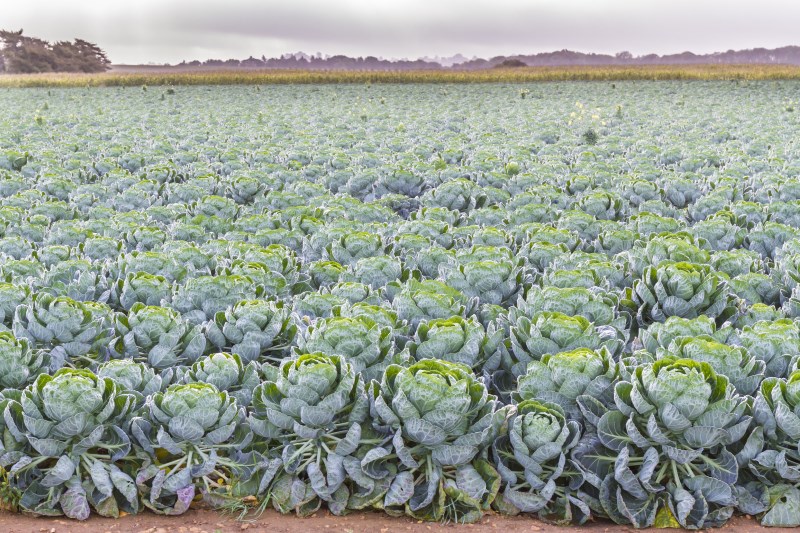
How Brussels Sprouts Grow
If you’re looking to plant your own Brussels sprouts, your backyard garden is the perfect spot.
Brussels sprouts will grow in all climates, but cool weather is best.
Brussels sprouts are a hearty plant and can even tolerate frost. Some say frost even improves the flavor or a sprout.
If planted in dry or hot weather, your Brussels sprouts will taste bitter and feel flimsy.
Plant your sprouts in early spring for autumn produce that will grow slowly and bear a long crop.
This vegetable will take up to three months to mature.
Brussels sprouts require at least six hours of sunlight each day.
Soil should be kept moist as with other such vegetables.
Don’t leave your seedlings dry for too long or they may become stunted.
A soil PH of 6 to 7.5 is recommended for lush-growing Brussels sprouts (1).
This annual plant can grow up to three feet tall and spread two feet wide.
They should be planted eighteen to twenty-four inches apart.
Bugs can be a problem for Brussels sprouts, including webworms, Aphids, diamondback moths, harlequin bugs, and cabbage worms.
Once they begin to grow, Brussels sprouts will look similar to cabbage, with large leaves growing off long green stems.
Brussels sprouts will begin to emerge from the center stalk of the plant and continue to grow upward.
Brussels sprouts are ready for harvesting when the green heads have grown between one and two inches, and sprouts are green.
Twist the sprouts away from the plant until they are removed.
Leaves can be removed after the buds form to make harvesting easier.
A single plant can yield two to three pounds of Brussels sprouts.
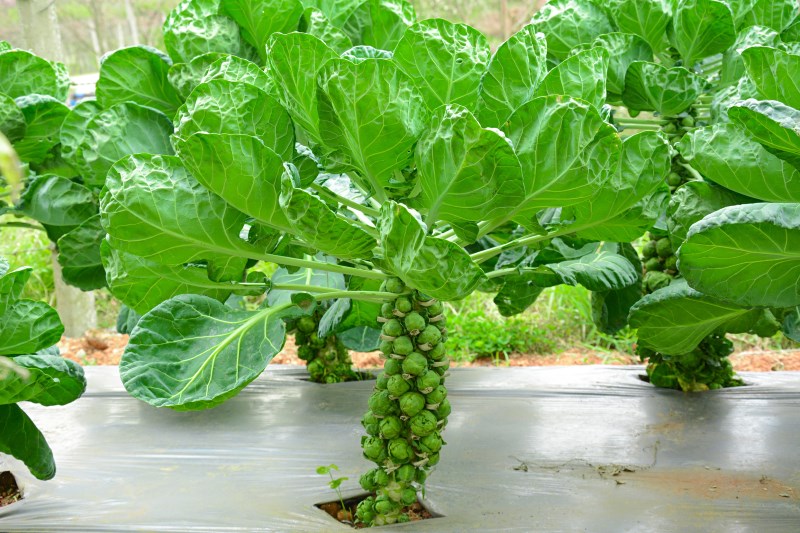
Varieties
More than 110 varieties of Brussels sprouts are available (2) and may be hybrid cultivars or open pollinated.
Differences in sprouts range from coloring to maturity time.
Size, spacing, hardiness zones, and root structures may also vary from one type of Brussels sprouts to another.
Here is a list of different types of Brussels sprouts.
- Bubbles
- Catskill
- Churchill
- Dagan
- Diablo
- Dominator
- Early Half Tall
- Evesham
- Falstaff
- Groninger
- Gustus
- Icarus
- Igor
- Jade Cross
- Long Island
- Mezzo Nano
- Oliver
- Red Bull
- Roodnerf
- Rubine
- Seven Hills
- Vancouver
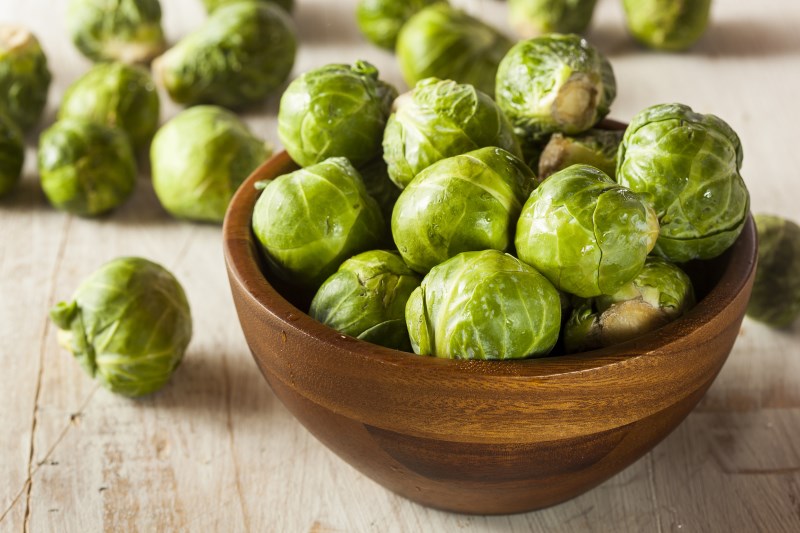
Interesting Facts
Aside from being good for you and having a colored history as the world’s most hated vegetable (3), there is still plenty to know about these baby cabbages.
Here are 20 fun facts about Brussels sprouts.
- Brussels sprouts were initially bred from wild cabbage to improve digestion.
- Kitchen Daily put together a list of the least popular foods in the United States. Brussels sprouts came out on top!
- In a global gathering referred to as Santacon, people from all over the world dress up as Santa Claus and get pelted with Brussels sprouts.
- Chinese physicians used to prescribe Brussels sprouts for bowel problems.
- The first reference to Brussels sprouts was found in the 1796 manual by Charles Marshall titled Plain and Easy Introduction to Gardening.
- Some people claim there are more than 5,000 ways to cook Brussels sprouts.
- The Guinness world record for the most Brussels sprouts eaten falls to a Swedish man named Linus Urbanec. He ate 31 sprouts in 60 seconds.
- September to February is the prime season for Brussels sprouts.
- Around seventy million pounds of Brussels sprouts are produced in the United States each year!
- Brussels sprouts can have a strong smell, which often happens when sprouts are overcooked. The smell, though, actually results from an organic compound that contains sulfur.
- Great Britain grows almost 6x more Brussels sprouts than the United States.
- The largest Brussels sprout ever grown weighed 18 lbs. and was grown in 1992.
- Some people find Brussels sprouts to taste bitter. These people have the gene TAS2R38, which enhances the receptors that taste glucosinolates, which is a bitter compound (4).
- The Netherlands produces 90,390 tons of Brussels sprouts annually, making them one of the largest producers in the world.
- In 2015, mountain climber Stuart Kettel scaled Mount Snowdon to raise money for cancer. He scaled the entire mountain while pushing a Brussel sprout uphill with his nose! It took him four days!
- Brussels sprouts are famous as a Christmas side dish.
- Brussels sprouts may not be the favorite treat at your dinner table, but they are a favorite to more than forty-six pests and bugs.
- Since they are in the Brassica family, Brussels sprouts are also related to collard greens, cauliflower, cabbage, and kale.
- Brussels sprouts are considered a gourmet dish in the United Kingdom.
- Smaller sprouts have more flavor than larger ones.
Nutritional Facts
The USDA National Nutrient Database reports that one cup of Brussels sprouts in the raw has 0 fat, 38 calories, 3 grams of protein, and 8 grams of carbs (5).
One cup of raw Brussels sprouts provides 10% vitamin A, 195% vitamin K, and 125% of the recommended daily allowance of Vitamin C.
Brussels sprouts also contain potassium, manganese, and vitamin B6.
30 Science-Backed Health Benefits
You may have bad memories of your mother’s Brussels sprouts at dinnertime, but here are thirty reasons to start enjoying them now.
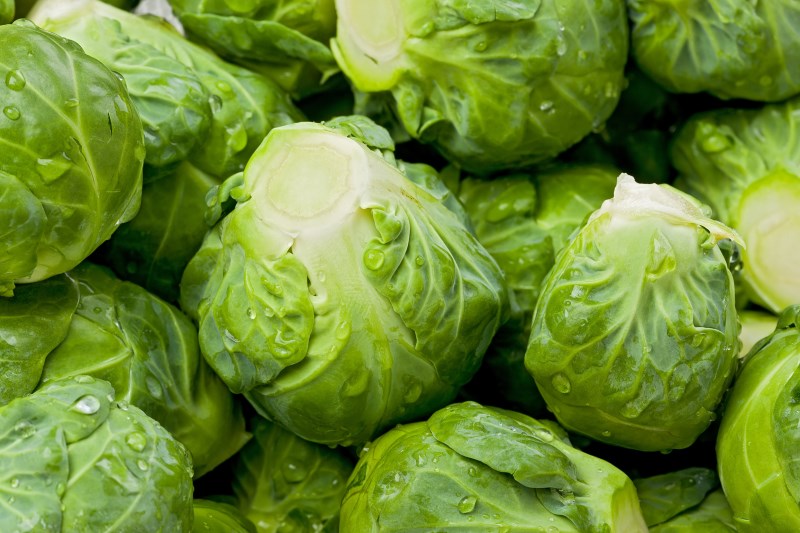
Brussels Sprouts are Full of Vitamins
Not only are Brussels sprouts great for growing children, but they also contain enough vitamins to boost the health of grown adults.
Brussels sprouts are rich in antioxidants and vitamins.
Just one cup of Brussels sprouts supplies the body with twenty vitamins.
Brussels Sprouts are Rich in Antioxidants
Brussels sprouts are full of healthy antioxidants.
Antioxidants decelerate or stop the oxidation of certain molecules in the body.
If these molecules were to oxidize, they turn into free radicals. An excess of free radicals may cause cell damage and even turn your cells against one another!
This begins a chain reaction of bad behavior (6).
Such damage can wreak havoc on your body.
This process is called oxidative stress.
Muscle degeneration, diabetes, heart disease, and cancer are all side effects of oxidative damage.
Eating foods rich in antioxidants will help prevent this oxidative damage.
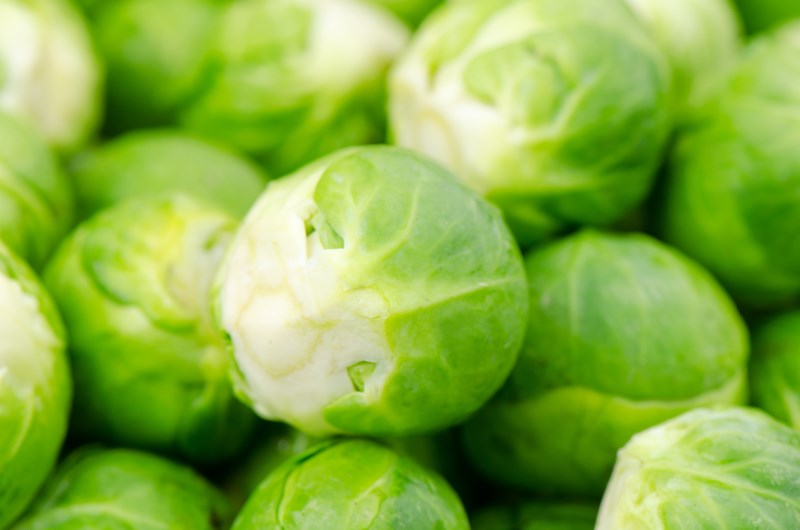
Brussels Sprouts and Blood Pressure
Brussels sprouts can lower your blood pressure.
Since they contain potassium, they can balance out negative salts in your body (7).
Salt raises the sodium levels in your blood, which will directly affect your kidneys being able to filter unwanted materials from the body by reducing the ability to get rid of water.
Eat plenty of Brussels sprouts for potassium to help your blood stay healthy and flowing.
Brussels Sprouts is a Natural Anti-Inflammatory
The vegetables you avoid during the holidays may actually help save your life!
Oxidative stress, or chronic inflammation, has been linked to different types of cancer (8).
Brussels sprouts are a natural anti-inflammatory.
These little green vegetables contain glucosinolate, which can naturally regulate the inflammatory system (9).
Not only are they nature’s way of calming your body down, but they can also act fast.
Brussels sprouts are full of vitamin K, which is directly related to inflammatory responses.
Regular intake of Brussels sprouts can do wonders as an anti-inflammatory, taking care of potential flare-ups at an early stage.
Another aspect of Brussels sprouts’ anti-inflammatory powers has to do with their Omega-3s.
These fatty acids help aid the body’s anti-inflammatory molecules (10).
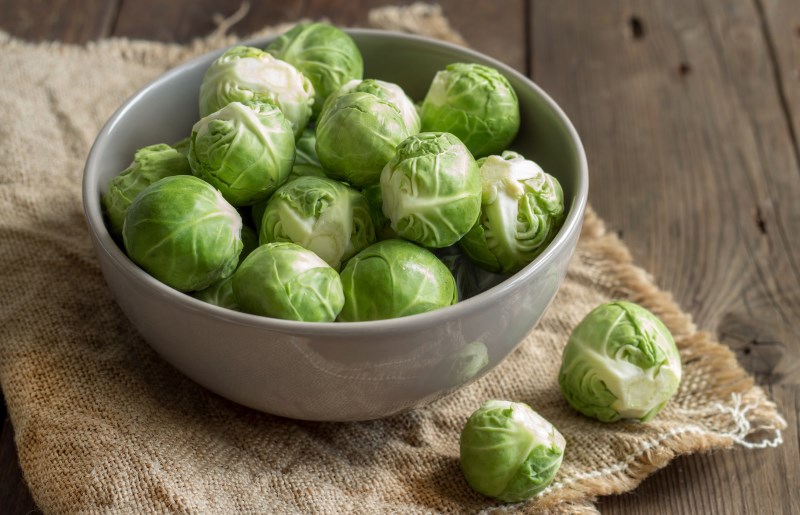
Brussels Sprouts and Copper
Brussels sprouts contain copper.
Copper deficiency can lead to birth defects, osteoporosis, anemia, low white blood cell counts, thyroid issues, raised cholesterol, and more.
Brussels sprouts are essential for healthy growth, making it even more important for your children to get their recommended daily allowance.
Copper helps promote healthy blood cell concentration, growth of tissues and organs, and protects the cardiovascular, nervous, and skeletal systems.
Copper is also essential for the immune system to function properly (11, 12).
Brussels Sprouts and Response to Injury
One of the biggest vitamin doses found in Brussels sprouts is vitamin K.
This essential vitamin isn’t as popular as vitamin C or B, but it’s just as important!
Vitamin K is one of the top nutrients responsible for injury response.
It does this by forming and regulating blood clots after injury.
Vitamin K is also used as a reverse blood-thinning process.
Osteoporosis, ineffective blood clotting, and excessive bleeding are all signs of a vitamin K deficiency.
Combat this and keep your body healthy by consuming delicious Brussels sprouts and make sure your body is getting enough vitamin K to go around (13, 14).
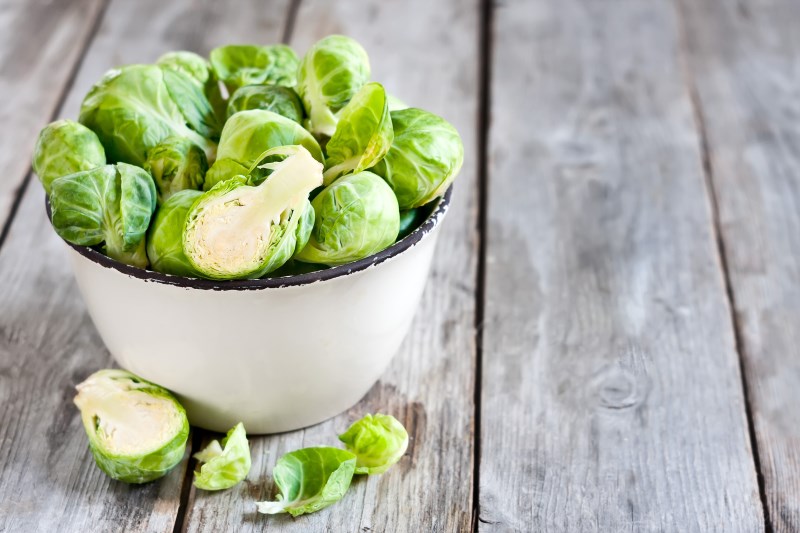
Brussels Sprouts and Immune System
You may naturally think of vitamin C in association with citrus fruits, but Brussels sprouts also contain this essential vitamin.
Vitamin C is a great immune booster since it contains so many healthy antioxidants.
These antioxidants will promote a healthy immune system by fighting off unwelcome free radicals (15).
This is why so many people take vitamin C supplements before going on airplanes or heading off on vacation.
Eating Brussels sprouts can reduce your risk of getting sick and help ward off infectious diseases, and all you have to do is eat it!
Brussels Sprouts and Digestive Health
Brussels sprouts provide up to 20% of your recommended daily intake of fiber.
This vegetable contains 3.8 grams of dietary fiber (per 100 grams).
To give you a better idea of how much that is, bananas only have 2.6 grams!
Fiber is essential for digestive health.
It will create a smooth stool that is easier to pass.
Fiber also prevents constipation, helps you to feel fuller, and helps the body maintain healthy levels of sugar (16, 17).
If you’ve ever not got enough fiber in your diet, you know how painful it can be.
Bloating, constipation and severe stomach pains are all side effects of a lack of fiber.
Serve your body well, and make sure you’re getting all the fiber you need by helping yourself to a helping of Brussels sprouts tonight.
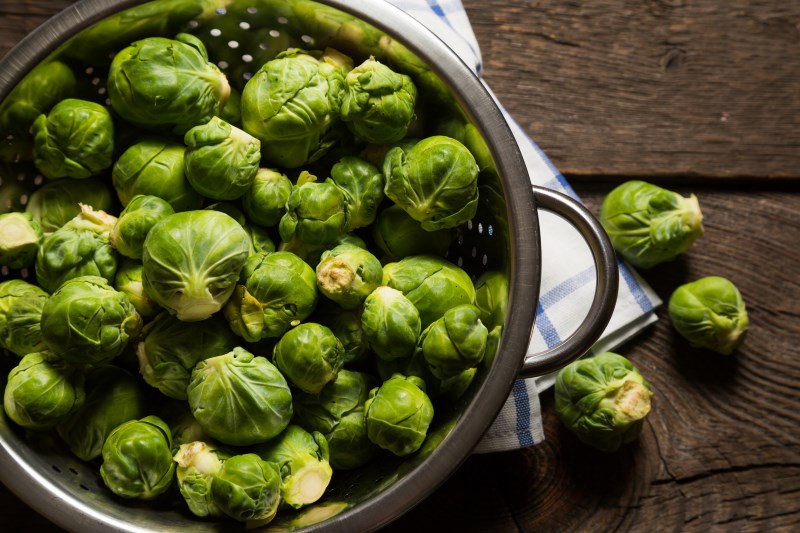
Brussels Sprouts and Type II Diabetes
Who knew Brussels sprouts could help reduce the risk of Type II diabetes?
The Centers for Disease Control and Prevention reports that 29.1 million people suffer from diabetes in the United States.
Brussels sprouts are full of vitamin K.
This vitamin increases your body’s sensitivity to insulin.
Studies have also shown that patients who took vitamin K supplements over the course of thirty-six months significantly improved their resistance to insulin (18).
Brussels sprouts also improve metabolic control in patients suffering from diabetes (19).
Brussels Sprouts and Your DNA
Research shows that the nutrients found in Brussels sprouts may actually protect and enhance your DNA.
Compounds found in Brussels sprouts inhibit the damaging effects on sulphotransferase enzymes to the DNA.
Brussels sprouts will also stabilize DNA that’s found within your white blood cells (20, 21).
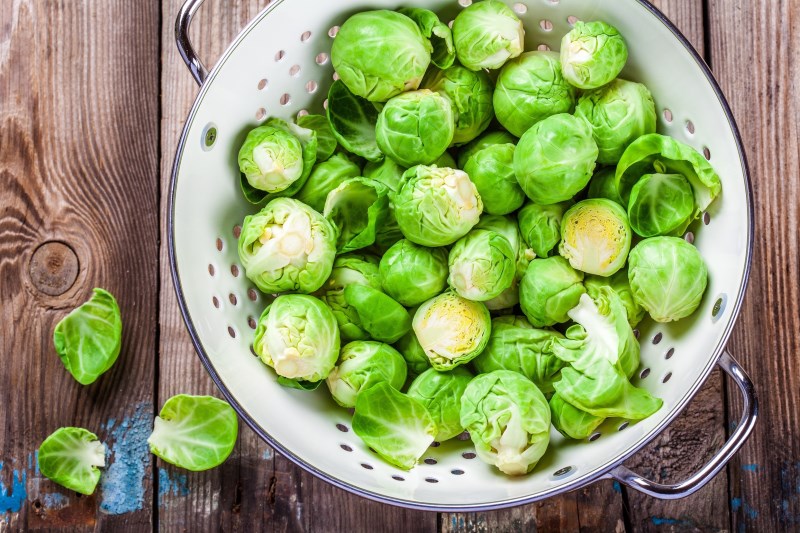
Brussels Sprouts and Stress
The next time you’re feeling stressed, try a cup of Brussels sprouts.
It may not sound like the ideal relaxer at first, but it works.
Studies show that Brussels sprouts may reduce high blood pressure (23).
This is because Brussels sprouts contain vitamin C, which is known to ease hypertension and reduce high blood pressure.
Since Brussels sprouts contain both vitamin C and antioxidants, it helps fight high blood pressure.
This is largely due to the free radical fighting power of healthy antioxidants found in the sprouts.
Brussels Sprouts and Cancer
Remember you read about the smelly glucosinolate sinigrin that gives sprouts their unpleasant odor?
This is the same characteristic that is responsible for cancer-fighting properties of Brussels sprouts.
Cruciferous vegetables, such as Brussels sprouts, kale, broccoli, and cauliflower, are all hailed for their cancer-fighting properties.
This is because of the glucosinolates found in these vegetables.
Research shows that glucosinolates have anticarcinogenic properties, meaning they will inhibit cancer development, including colon, lung, rectal, and lung cancer (24).
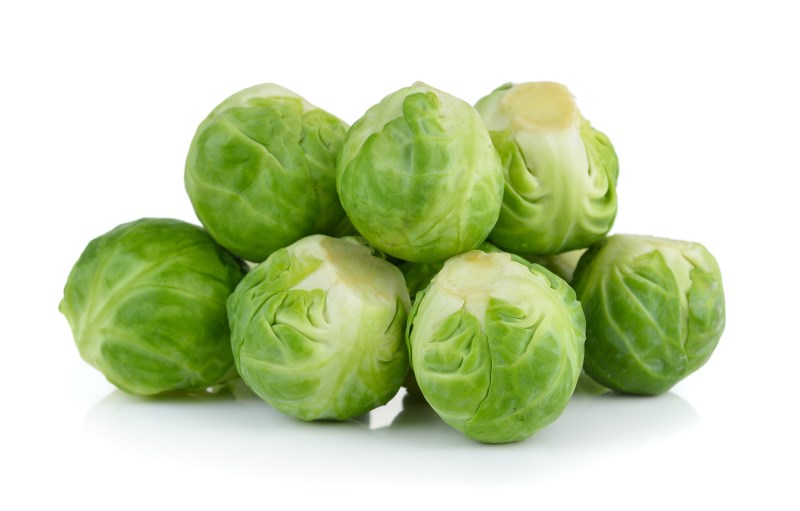
Brussels Sprouts and Manganese
Manganese is a trace mineral that can be found in Brussels sprouts.
This mineral is commonly found in the kidneys, liver, pancreas, and bones.
Plant-based diets are usually rich in manganese.
This mineral is essential for the development of nerve and brain function, the formation of the connective tissues and bones, as well as the healthy functioning of sex hormones.
Manganese may help prevent or ease arthritis, osteoporosis, PMS, epilepsy, diabetes, and more (25).
Brussels Sprouts and Iron Absorption
Brussels sprouts contain copper, which helps the body absorb iron.
Iron is essential for the body to run smoothly.
This mineral is important to your body’s hemoglobin, which helps carry oxygen from your lungs.
Iron also helps the body maintain healthy nails, cells, hair, and skin (26).
Iron is also essential for maintaining healthy muscles.
Iron provides your muscles with the oxygen they need to create contractions and maintain elasticity and tone.
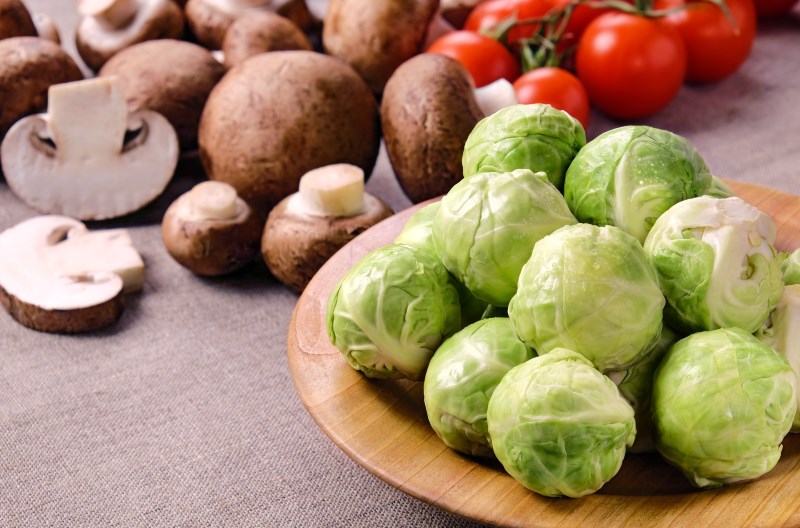
Brussels Sprouts and Detox
Brussels sprouts contain sulfur, which is actually good for your overall health.
Sulfur assists the body by removing both dietary and environmental toxins from inside.
The glucosinolates found in Brussels sprouts also help in the body’s own detoxification.
This little green vegetable is packed with antioxidants.
Since the body needs strong antioxidants during the detox process, this makes Brussels sprouts all the more ideal for an all-natural cleanse.
If using Brussels sprouts as a form of natural detoxification, be sure to use fresh (not frozen) sprouts, and do not blanch them (27, 28, 29).
Brussels Sprouts and Arthritis
Brussels sprouts can help reduce symptoms of rheumatoid arthritis.
Arthritis is a disease that involves inflammation of your joints.
This inflammation can cause stiffness and sharp, shooting pains.
Because Brussels sprouts are a natural anti-inflammatory, proper consumption may ease the pain felt by those living with arthritis.
Brussels sprouts and other cruciferous vegetables contain sulforaphane.
This compound is currently being studied to show a connection with slowing cartilage damage caused by osteoarthritis (30).
One study by the American Journal of Epidemiology published by the Oxford Journals found that cruciferous vegetables may even slow or prevent the development of rheumatoid arthritis (31).
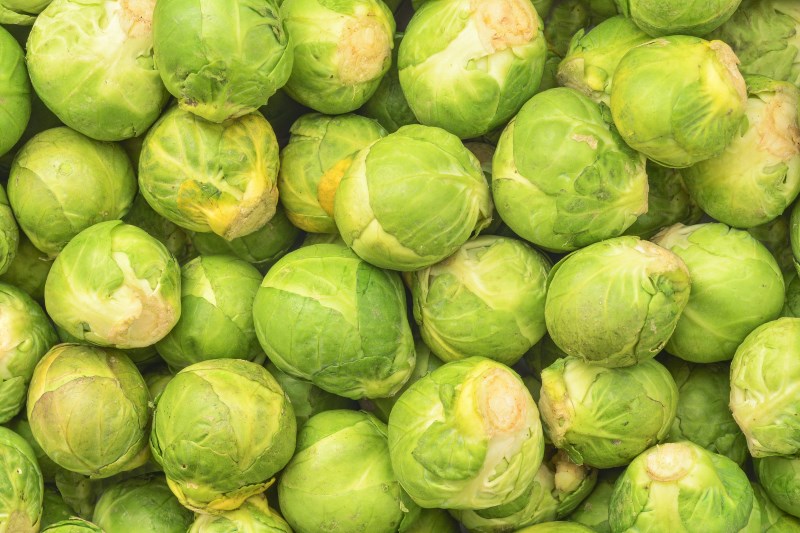
Brussels Sprouts and Your Eyes and Hair
Regularly eating Brussels sprouts helps promote pigmentation of your eyes and hair color.
Brussels sprouts contain copper, which contributes to the health and pigmentation of your eyes and hair.
This is because copper contains melanin, a transmitter of color to the skin and other areas of the body.
Intake of copper can help prevent premature graying and keeps your cells healthy and your eyes bright and vibrant well into old age.
Copper is also needed to create collagen and elastin, which are essential for a firm and healthy skin (32, 33).
Brussels Sprouts and Tissue Regeneration
If you want glowing, healthy-looking skin, eating Brussels sprouts is one way to achieve your goal.
Brussels sprouts contain vitamin C, which helps the body repair and regenerates tissue.
The body needs good nutritional intake to successfully complete the healing process.
This makes vitamin C an integral part of the body’s healing system since it aids in collagen synthesis and helps boost the body’s immune system (34).
Vitamin C can also help combat photoaging and can be used to treat hyperpigmentation in the skin (35).
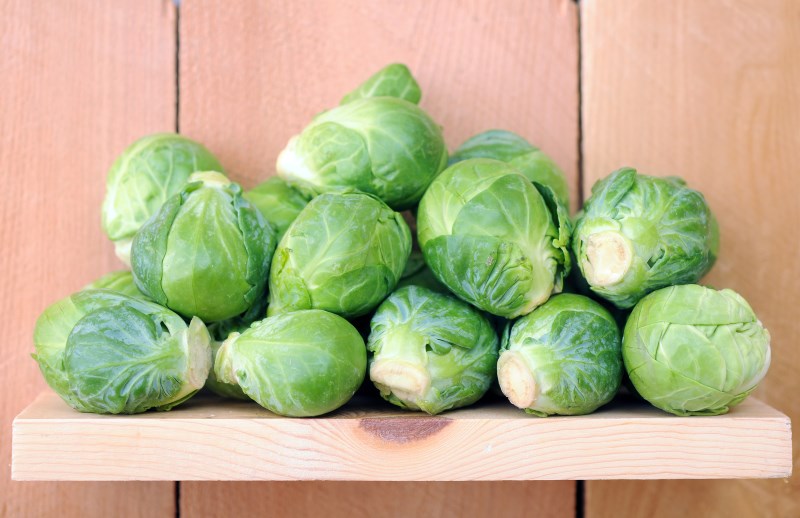
Brussels Sprouts and Bones Health
Brussels sprouts are great for the development of healthy bones.
No matter what your age, your bones can benefit from adding Brussels sprouts to your diet because they contain vitamin K.
Vitamin K helps your body build strong bones.
This vitamin helps promote healthy bone density, especially when working alongside vitamin D.
When working together, these vitamins positively affect the balance of calcium in your body (36).
Strong bones are beneficial for young and old alike.
Children need plenty of calcium and vitamin K to build strong bones as they grow, while adults will benefit by reducing their risk of osteoporosis and increasing their athletic performance.
Brussels Sprouts and Red Blood Cells
Brussels sprouts are great for your red blood cells.
Brussels sprouts are high in vitamin B6 or pyridoxine.
This is a water-soluble vitamin that assists in red blood cell formation.
Blood has four main parts: red blood cells, white blood cells, platelets, and plasma.
Red blood cells are hard workers in your bloodstream.
Not only do red blood cells transport oxygen throughout the body, but they also assist bodily tissues and transfer carbon dioxide (37).
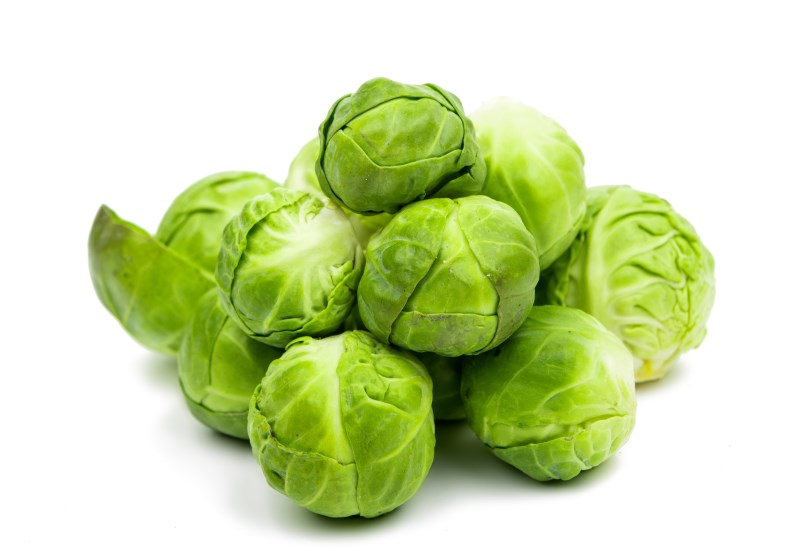
Brussels Sprouts and Cholesterol
Brussels sprouts not only improve your circulation but also help lower cholesterol.
These benefits increase when you steam them.
Steaming helps the fibers found in your sprouts become more potent and allows them to bind to your bile and stomach acids, which will help lower your cholesterol (38).
Brussels Sprouts and Healthy Pregnancy
Brussels sprouts contain folic acid or folate.
This is a form of vitamin B that aids in the production of red blood cells and helps growing babies develop properly.
Folic acid is essential for a healthy pregnancy.
This acid helps you produce the amount of blood needed to support your growing child.
Folic acid also helps prevent birth defects in growing babies.
Proper intake of folic acid may also help prevent early deliveries (39, 40)!
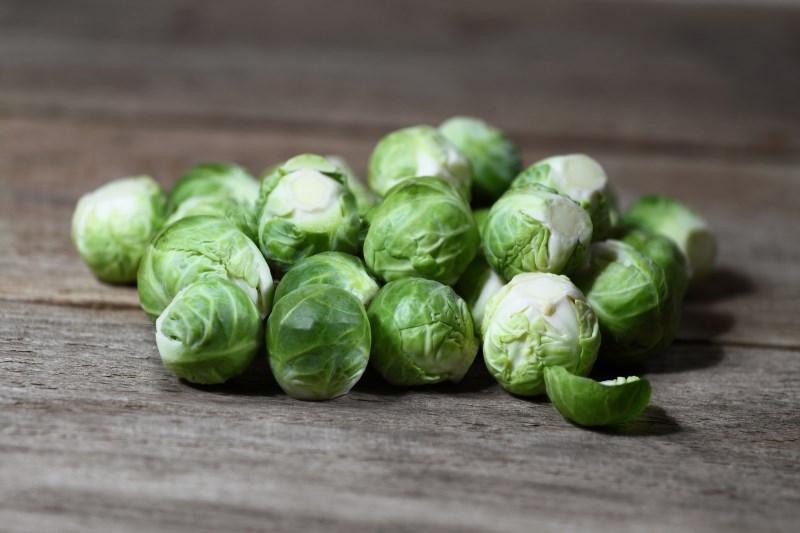
Brussels Sprouts and Nerve Function
Brussels sprouts contain potassium, which is key to maintaining a healthy body for numerous reasons.
Potassium assists the body with nervous functions, biochemical reactions, helps synthesize protein, aids metabolism, helps build muscles, and contributes to normal growth.
This mineral also directly impacts the functions of the nervous system.
Sodium and potassium aid in the conduction of nerve impulses and help generate contractions and healthy functions of the heart (41).
Brussels Sprouts and Harmful Bacteria
Brussels sprouts’ copper content has antimicrobial properties.
Copper is a strong antimicrobial that has been utilized for decades.
Copper can help inhibit the growth of harmful microorganisms or bacteria, such as E. coli or C. difficile.
Antifungals or antibiotics are also used to fight harmful bacteria.
Antimicrobial copper can kill pathogenic microbes and reduce bacteria (42).
This is useful in preventing hospital patients from developing an infection during their stay.
The benefits of copper as an antimicrobial property are almost endless.
Copper is environmentally friendly, recyclable, green, and effective.
Keep Brussels sprouts as a staple in your diet to reap the benefits of its vitamins and minerals.
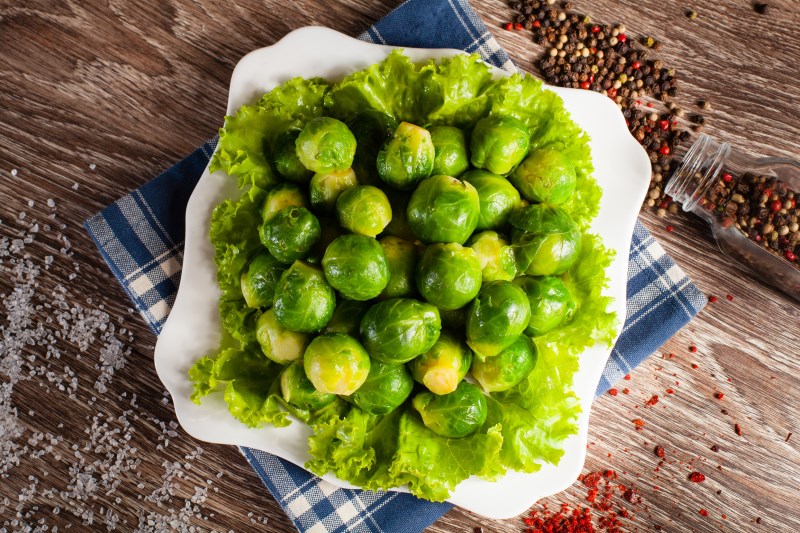
Brussels Sprouts and Melatonin
Melatonin is a hormone produced in the pineal gland.
This gland is found in the center of the brain (43).
This hormone is responsible for women’s reproductive cycle and regulates women’s menstrual cycles.
Melatonin also affects menopause.
Melatonin is beneficial for your body for a number of reasons.
It boosts your immune system and is also a powerful antioxidant and anti-inflammatory.
Curiously, melatonin is only released later in the day, often causing you to feel tired.
This effect will last for twelve hours until your sleeping cycle is complete.
This cycle can be thrown off if you do not get enough light during the day or too much light at night.
This helpful hormone also supports your immune system and slows the aging of the brain.
Melatonin may also counteract breast cancer cells (44).
Brussels Sprouts are Low in Fat
Most vegetables are high in vitamins and low in fat.
A 100-gram serving of Brussels sprouts contains a mere 0.3 grams of total fat.
Brussels sprouts are also low in sodium, with just twenty-five milligrams.
Sticking to low-fat, healthy vegetables means less risk of heart problems and fat accumulation around the arteries.
A low amount of salt also helps prevent future problems, such as hypertension, edema, and cardiovascular issues.
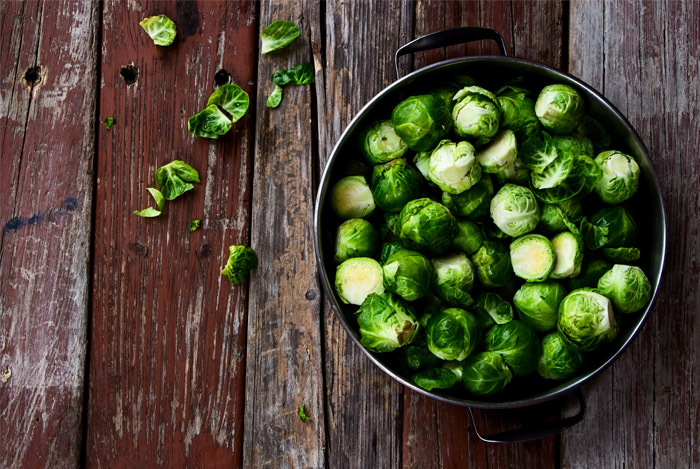
Brussels Sprouts and Helicobacter Pylori
As your vegetable intake increases, your risk for serious diseases and cancers lowers.
Brussels sprouts are no exception.
Helicobacter pylori is a form of bacteria that can be harmful to your body.
Commonly referred to as H. pylori, this bacteria can damage your stomach lining and cause peptic ulcers. H. pylori can spread from person to person and can even lead to gastric cancer.
Brussels sprouts contain sulforaphane, which protects the lining of the stomach from this harmful bacteria.
A diet that is high in salt may increase your risk of getting H. pylori.
As stated, Brussels sprouts are low in salt.
The vitamin C found in Brussels sprouts can also help heal damaged stomach lining (45, 46).
Brussels Sprouts and Gla-proteins
Brussels sprouts contain 218.87 mcg of vitamin K per cooked cup.
Vitamin K affects a minimum of 16 Gla-proteins found within the body.
These proteins keep your bones healthy and prevent calcium loss.
Gla-proteins also prevent calcification in the arteries (47).
These proteins are also responsible for binding calcium ions and maintaining bone organization.
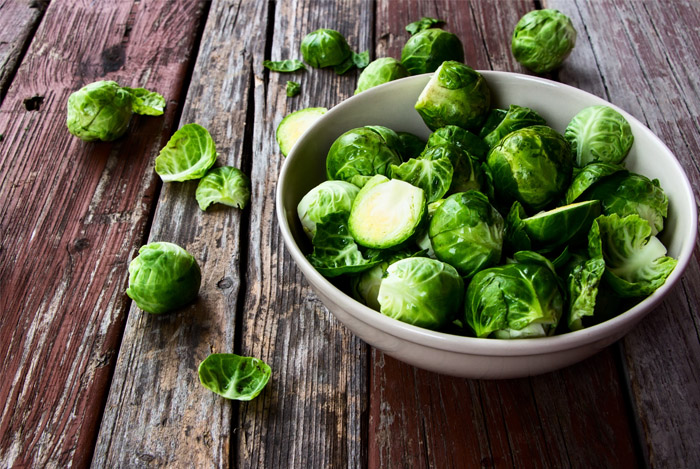
How to Buy and Store
Brussels sprouts can be found in the market pre-plucked or still on the stem.
Sprouts that are still on the plant stem usually taste much fresher.
When shopping for Brussels sprouts, look for vibrant green colors and firm skin with tight leaves.
To keep your Brussels sprouts as fresh as possible, you’re going to want to store them properly.
Before storing trim off any loose leaves, stems, or brown areas.
Brussels sprouts have gone bad if the stems turn brown, get slimy, or develop a smell.
When storing in the refrigerator, seal your Brussels sprouts in a plastic bag and store in the crisper.
For freezer storage, blanch your Brussels sprouts in hot water for five minutes.
Submerge sprouts in cold water immediately and store in a freezer-safe plastic bag.
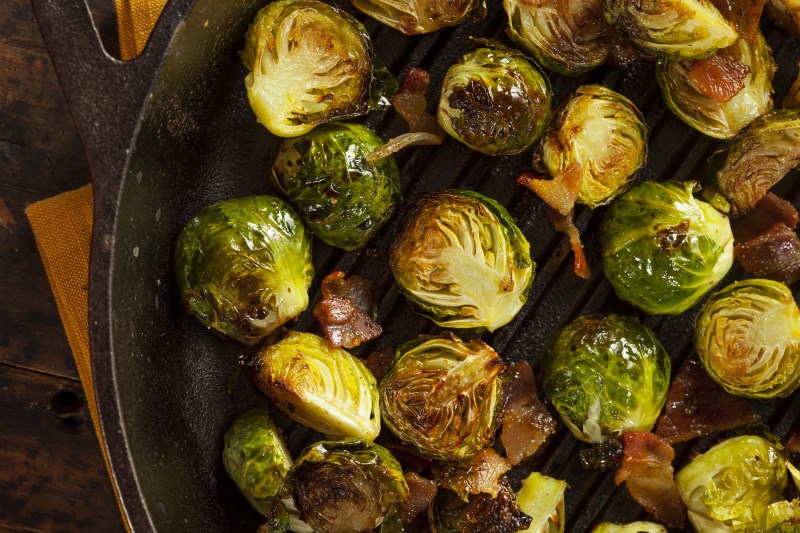
How to Add More to Your Diet
Now that you know Brussels sprouts are good for you, you’re probably wondering how to make them taste delicious too.
Adding Brussels sprouts to your diet is as simple as finding a recipe you like.
Cooking Brussels sprouts is easy.
You can roast, BBQ, sauté, bake, boil, and steam them for a healthy side dish.
Be sure to carve an X shape into the stem of a sprout to help cook the vegetable evenly when steaming.
Here are four ways to add more Brussels sprouts to your diet.
Find a Recipe you like
If you’re not a fan of Brussels, you probably just haven’t found a recipe you like.
There are hundreds of ways to cook Brussels sprouts that don’t follow your grandma’s old adage of “Cook them until they are mush!”
Roast Them
Lay your Brussels out on a baking pan and drizzle with olive oil, salt, pepper, and lemon juice.
Roast at 400° F for 30 minutes.
Serve Brussels Sprouts with Bacon
Who doesn’t love bacon?
Bacon makes everything better, even Brussels sprouts!
Sautee your sprouts in a pan with bacon, garlic, salt, pepper, and oil until they are tender. Then enjoy.
Asian Glazed Brussels
Mix your sprouts in a marinade of soy sauce, maple syrup, sriracha, garlic, oil, salt, and pepper and bake in the oven at 400° F for one hour.
The result is a crispy, Asian-inspired vegetable dish.
Brussels Sprouts Vitamin
There are many vitamins on the market that contain Brussels sprouts.
These vitamins can be taken daily to enjoy the health benefits of Brussels sprouts without the taste.
Make it a Smoothie
What better way to hide the taste of a vegetable you don’t like than to add it to a smoothie?
Morning smoothies can be a great way to start the day, especially when they’re made at home.
Mix your Brussels sprouts with raspberries, honey, water, strawberries, bananas, Greek yogurt, anything!
Simply toss in a handful of sprouts to your normal smoothie combination for a clean and refreshing way to start your morning.
For the Picky Eater
Whether you’re old or young, there’s always going to be a picky eater at the table.
If your children don’t like Brussels sprouts, there are still ways to get them to eat these healthy morsels.
Serve it with chips
If it comes with a side of the dip, people will want to eat it!
Creamy Brussels sprouts dip involves mixing sautéed and chopped Brussels sprouts with shallots, garlic, cream cheese, mozzarella, parmesan cheese, and sour cream.
Heat and serve with chips.
This dip is so delicious that your guests won’t even know they’re eating these dreaded sprouts!
Throw it on a Pizza
Making a vegetable pizza at home?
Try adding some roasted and chopped garlic Brussels to reap the healthy rewards.
Drizzle it with cheese
When in doubt, cover it with cheese.
Melt some cheddar cheese and milk together in a saucepan, and mix with salt and pepper for a delicious sauce for your sprouts.
Shred it
Shredding your Brussels sprouts is a great way to add this vegetable into everyday dishes as well as savory pieces of bread, salads, pasta, and stir-fry.
Make it into a Fritter
Fritters are a mixture of a vegetable, flour, breadcrumbs, egg, and sometimes cheese.
Combine these ingredients with mashed Brussels sprouts, and fry in a pan with olive oil on both sides.
This is a crispy and delicious way to get more Brussels sprouts into your daily dinner diet.
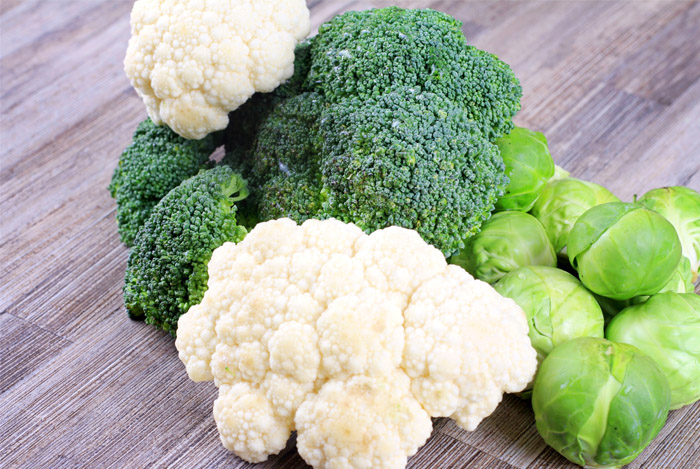
Precautions
True, Brussels sprouts are packed with healthy vitamins and minerals, but that doesn’t mean they’re for everyone, and we’re not just talking about the taste!
Warfarin
People who are taking the blood-thinning medication warfarin are advised to stay away from foods that are high in vitamin K.
Too much of this vitamin can lessen the medication’s effectiveness.
For women, a healthy amount of vitamin K while on warfarin is 90 mcg, and for men, it is 120.
Since Brussels sprouts are high in vitamin K, you should avoid consuming them in large amounts.
Gas
Brussels sprouts contain sulfur and raffinose, both of which can cause painful gas.
Thyroid Issues
People with thyroid issues should avoid eating raw sprouts.
Raw Brussels sprouts contain goitrogens, which can disrupt the functions of the thyroid gland.
Remedy this thyroid no-no by cooking your sprouts to render the goitrogens inactive (48).
Digestion Issues
Those suffering from digestion issues or problems with bloating may want to stay away from Brussels sprouts because they contain naturally occurring toxins that cause bloating and gas (49).
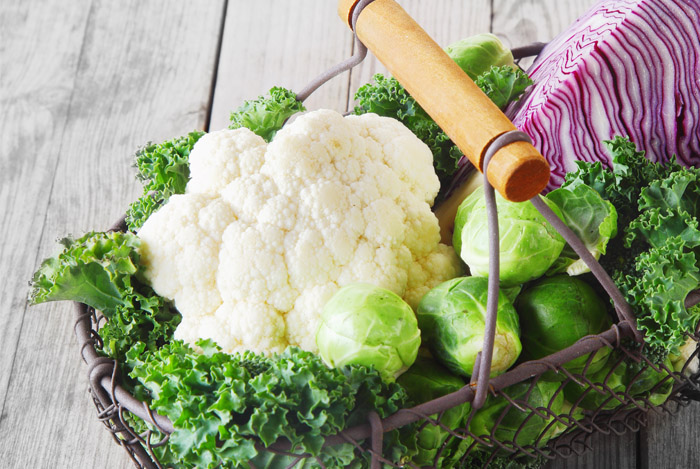
Conclusion
Still, think Brussels sprouts are one of the world’s most disgusting vegetables?
Try giving them another shot.
There are plenty of delicious ways to prepare these sprouts that won’t have you harking back to your childhood!
There are so many science-backed health benefits of Brussels sprouts that they’re definitely worth a second chance.
FDA Compliance
The information on this website has not been evaluated by the Food & Drug Administration or any other medical body. We do not aim to diagnose, treat, cure or prevent any illness or disease. Information is shared for educational purposes only. You must consult your doctor before acting on any content on this website, especially if you are pregnant, nursing, taking medication, or have a medical condition.
HOW WOULD YOU RATE THIS ARTICLE?
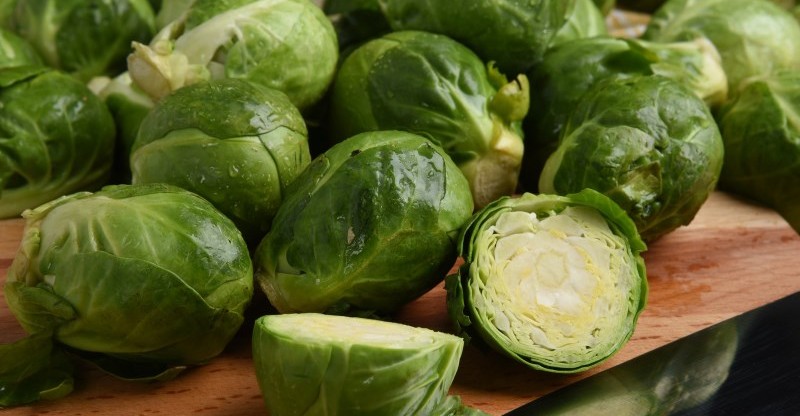


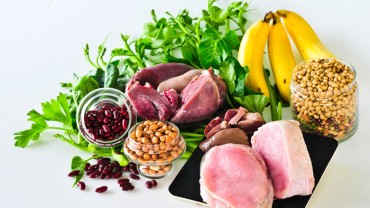
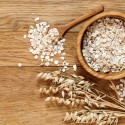
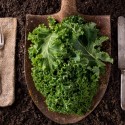
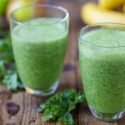
Can high Brussels sprouts consumption substitute pills I take to lower my blood pressure?
How many varieties! Thank you for this interesting article!
really awesome information about Brussels sprout.
Thanks for sharing such a useful information.
Can I grow this wonderful vegetable indoors?